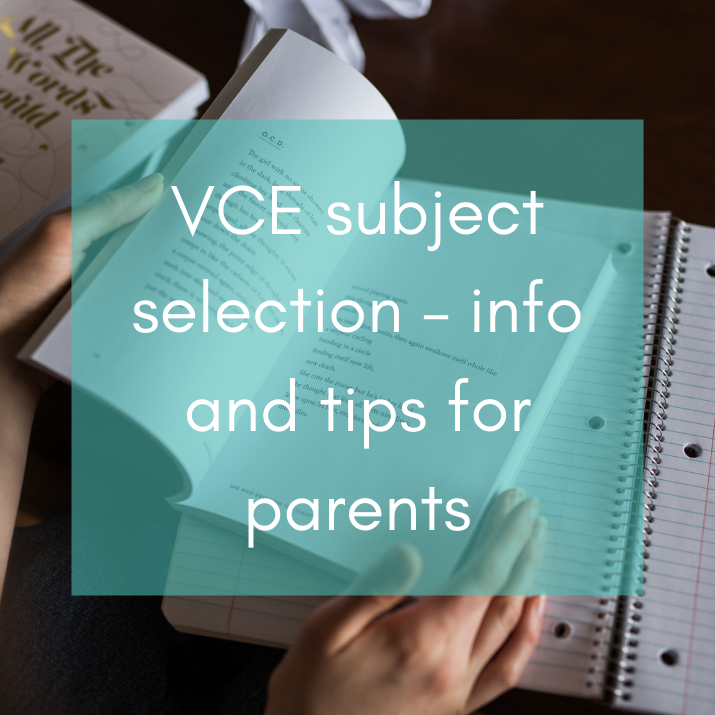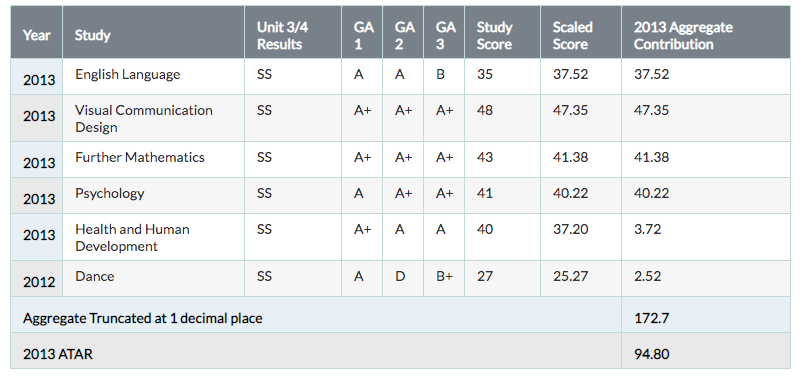
If you didn’t study yourself under the VCE structure (I didn’t!) there can be quite a bit to learn as a parent of a child going into years 11 and 12. To help families who are about to start this journey I have put together some key information that I found helpful with links to their sources, plus some tips on what has worked with our kids when it comes to guiding them with subject selection.
VCE subjects and structure
Victorian Certificate of Education (VCE) is the most common way that students in Victoria complete years 11 and 12 – their last years of secondary school.
The VCE includes more than 90 subjects to choose from. The subjects offered at each school will differ, so this is something to consider when looking at secondary schools for your child.
Subjects for years 11 and 12 are referred to as units:
- Units 1/2 are usually studied in year 11. They can be studied as single units and don’t need to be in a certain order.
- Units 3/4 are usually studied in year 12. They must be studied in a certain order (called a sequence) within the same year. You cannot do a unit 4 subject without first completing the unit 3 subject for it. {Source}
Raw Scores
When a student completes the VCE their results are produced by the VCAA (Victorian Curriculum and Assessment Authority).
Each Unit 3/4 sequence completed will be reported on the student’s Statement of Results with the following:
- Unit result (S = Satisfactory pass, N = Not satisfactorily passed)
- Three graded assessments (letter grades, e.g. B+)
- One study score (maximum 50)
The study scores are raw scores. {Source}
Scaled scores
VCAA sends the student’s raw scores to VTAC (Victorian Tertiary Admissions Centre) where they are converted into subject scores or as they are commonly referred to – scaled scores.
The scaled subject scores are then used to calculate the student’s ATAR (Australian Tertiary Admission Rank). {Source}
Calculating study scores
Before the scores of different VCE studies can be added together for the ATAR, they need to be scaled to take account of the different levels of competition in different studies.
The study score is not a score out of 50. It is a ranking or relative position which shows a student’s performance compared with all other students who took that study in that year. A student with a study score of 30 is in the middle of the cohort, or has performed better than about half of all students. A student with a study score of 40 has performed better than about 91% of all students who did that study.
What this means is that the middle student in any study will have a study score of 30, regardless of how strong the other students were in the study and how difficult it was to achieve the middle ranking. This does not mean that some studies are inherently more difficult than others. In fact, most are designed to be of equal difficulty. However, the stronger the competition, the harder it is to achieve the middle score of 30. {Source}
Mathematics
VCE Mathematics studies are designed to cater for students of differing abilities and interests. Specialist Mathematics is the most difficult, followed by Mathematical Methods (CAS) and then by Further Mathematics.
To ensure that students undertaking the more difficult mathematics studies are not disadvantaged, all three mathematics studies are scaled against each other as well as being scaled against all other studies. The higher of the two resulting scales is used for each of the mathematics studies. {Source}
Languages
As a result of government policy to encourage the study of languages, a further adjustment is made during the scaling process. Each Language is adjusted up by adding five to the initial VTAC scaled study score average. All students of a Language receive an adjustment, but it is not a uniform adjustment. For study scores at or close to 30, the adjustment is 5, but the adjustment decreases as the study score moves away from 30. {Source}
Scaling down

You won’t really find a list of what subjects are scaled down, but your child in year 11 will be able to tell you! The above scaling example comes from the VTAC website and they have other examples if you like to check them out here.
In this example you can see that the study scores for all subjects other than English Language where scaled down.
Tips for parents to help kids with subject selection
Our daughter in year 10 has just finalised her subjects for year 11, so we are in the initial stages of our third VCE journey.
Year 11 subject selection is important as what subjects they choose feed through to year 12. This is particularly so for the more advanced maths and science subjects. For other subjects it is possible to study the 3 & 4 units without doing the 1 & 2 but your child needs to talk to their school about how they approach this.
As subject selection can flow through to year 12 it is the time to have discussions on what they might like to do after year 12. If they are thinking they want to go to university then prerequisite subjects need to be considered.
So far none of my kids have known for certain what they want to do at university when they are in year 10 and need to start choosing their VCE subjects. The schools our children have attend both have comprehensive careers programs in year 10 to help them hone in on what may be suitable career paths for them.
If your school doesn’t provide this information it might be worthwhile checking out this page what career or job suits me? from Headspace as it has some great info and resources with your child.
The advice I have given to our kids regarding subject selection has been to:
- Choose subjects they enjoy.
- Choose subjects they are good at.
- Consider keeping maths at the highest level that is appropriate for them, if they are still not sure what they want to do.
- Consider keeping a science subject if they think they may need it for a pre-requisite for a university course.
- Consider if the subject will require significant additional work time just so they can keep up and how that could impact other subjects.
- Consider the total workload of the subjects they choose.
- Don’t consider scaling as part of their decision making process.
To a certain extent they can try out subjects in year 11 and if they don’t work out, they can make different choices for year 12. For example one of our kids did biology in year 11 but decided he really wasn’t interested enough in it, to do it in year 12.
When it is has come to year 12 subject selection, after providing guidance we have ultimately left it for the kids to decide, even if we have had reservations about subject choice. One child changed a subject two weeks in to year 12 which was less than ideal, but it was a better outcome that he made the decision, rather than it was forced upon him by us.
VCE is two years of our kids lives and while they are important, we have made sure our kids now that it is not the be all and end all. We have wanted them to know there are so many ways to make your way to an end career destination and they are likely to take multiple career paths over their life time.
If as parents we can be calm and considered about VCE, it can set a great example for our kids.
